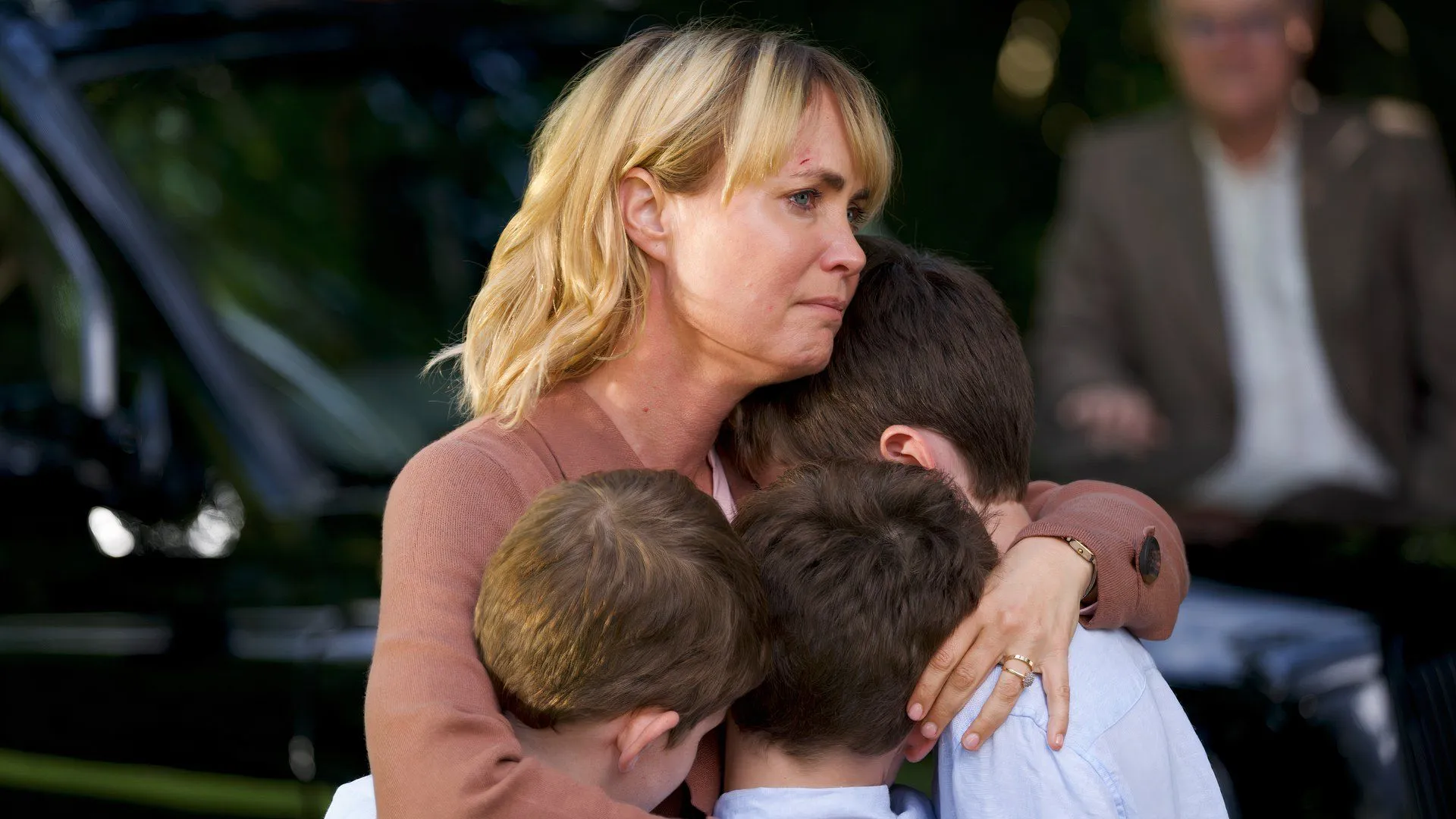Take My Hand tells the moving true story of one couple’s ability to overcome immense challenges through the resilience of love. Set against the backdrop of a devastating illness, the Australian drama explores what it means to support a partner during their darkest days and rekindle lost connections. Drawing from real experiences yet crafted for universal understanding, the film navigates heavy subjects with honesty, heart, and hope.
We learn Laura was diagnosed with multiple sclerosis years prior, after collapsing at her son’s football match in London. Once a high-powered career woman, she now faces an uncertain future managing a progressive condition. Returning to her rural hometown in Australia, old memories reopen when meeting Michael, her teenage sweetheart, after two decades apart.
Director John Raftopoulos draws from his own romance, giving the narrative an authentic pulse. Through nostalgic flashbacks, we see Laura and Michael as youths falling for each other’s free spirits, yet duties pull them towards divergent journeys. Reuniting in later life shows the maturity of their bond, supporting each other through hardships rather than running from difficulty. Radha Mitchell and Adam Demos convince as souls rekindling an eternal flame, though weathered by life’s storms.
With compassion, the film addresses living with an icy illness that attacks both body and mind. It highlights finding inner strength even when independence fades and reminds that living fully isn’t defined by abilities but relationships. Take My Hand ultimately tells a story near the director’s heart, one professing love’s ability to uplift us above all adversity and create new beginnings from life’s fragments.
Finding Home
This film tells Laura’s emotional journey as she navigates an MS diagnosis halfway through life. Originally from a small Australian town, she built a career in bustling London along with her family. But everything changes when collapsing at a football match reveals her condition.
Forced to step away from a busy lifestyle, Laura returns home seeking steadiness. Yet what she finds is more than just a place—in reconnecting with her roots, old flames are rekindled. Flashbacks introduce the passionate teenager she was, riding horses along beaches with Michael before duties pulled them apart.
Through Laura, we experience MS stripping away what she knew to be true. Her partner focuses on work as abilities fade, leaving her to face fears alone. But returning “home” offers comfort, with siblings and parents welcoming her back without judgment. It’s here friendship blossoms anew with Michael, who sees her inner beauty beyond illness.
Radha Mitchell breathes heart into Laura’s plight, showing the isolation of losing one’s body. Adam Demos matches her care as Michael, unwavering in his support. Together they display caring and can conquer time, accepting each other’s scars too. Family plays key roles also, embodying how love never wavers for those in need.
This tale finds hope in community. As Laura accepts changes through companions lifting her spirit, it expresses disability need not define one’s worth or prevent finding a place. Sometimes, home is not just where we live, but who accepts us fully as we are.
Steadfast Hearts
This film belongs to its stars. As Laura, Radha Mitchell brings strength yet fragility to a complex role, laying bare the soul-deep ache of watching sickness slowly overtake your body. She shows illness chipping away at independence in quiet moments most don’t see—hands refusing to cooperate, balance wavering in ways pride can’t withstand. It’s courageous work that ensures Laura’s dignity remains present even when health starts abandoning her grip.
By her side stands Adam Demos as the understanding Michael. His character could so easily have felt like an obligatory romantic plot device. But Demos injects earnest care into the role, convincing as someone steadfastly standing with Laura through difficulty, not out of design but out of devotion. Their chemistry sparks a will-they-won’t intrigue, but more importantly, their soulful performances together depict love capable of lifting her brightest days once again.
Supporting cast deliver depth too. As parents, Laura’s delight in familiar faces of home feels genuine. Young stars embracing roles show youthful spirit despite life’s turns since. Each brings layered humanity that deepens the broader tapestry of relationships, strengthening Laura when she most needs anchors.
This core ensemble makes Take My Hand a film of nuance and heart. While telling an inspiring true story, performances ensure Laura remains fully realized—a heroine experiencing all life can offer, both beauty and brutality, but refusing to face either aspect alone so long as care remains at her side.
Guiding with Grace
First-time director John Raftopoulos steers this story with a sure, understated hand. He captures the essence of his own journey in a way feeling universal yet intimate. Raftopoulos fashions the romance through nostalgic flashbacks, establishing why time can’t weaken true care’s core.
With empathy, he depicts MS gradually chipping away at independence in a gritty yet never exploitative way. The condition feels devastatingly real through restraint, not dramatized melodrama. We witness resilience, not just illness.
Raftopoulos imbues every scene with heart, from tender reunions to silent solace shared, without dwelling in saccharine mush. He unlocks profound moments from small gestures. We understand sorrow but also discover joys, persevering through dark days with compassion’s gentle guidance.
Lurking brutality remains present yet never consumes the narrative. This director guides with a light touch, prioritizing sincerity over sensationalism. Authentic, grounded performances then seize the reins, translating his vision into a piece comforting in candor, celebrating that love often blooms stronger when weathered by life’s harshest winters.
Everlasting Hearts
This film uplifts with its portrayal of love’s enduring ability to blossom unexpectedly. Though decades have passed since teenage years, Laura and Michael rediscover their connection runs deeper than time or distance.
Their rekindled romance depicts familial love taking new shapes too. By embracing each other’s children as her own, Laura finds belonging amid changing conditions. We see resilience in creating a united support system from varied backgrounds.
MS alters Laura’s daily reality drastically. Yet throughout, the narrative highlights inner strength exceeding surface troubles. With compassionate companions, she adjusts without losing identity. Dignity remains hers to keep through darkness, also bringing out loved ones’ finest selves.
Above all, Take My Hand celebrates the triumph of hope—that even when faced with life’s harshest blows, valuing tomorrow sees us through the night. By opening their worlds to fresh starts, Laura and Michael teach finding purpose anew need not mean losing what once was but moving forward together.
This film portrays love as a garden continuously blossoming, however winds may blow. Through mutual care and acceptance of each other wholly, its protagonists bloom most vibrantly despite life’s most frigid seasons. Their commitment to growth despite all exemplifies resilience from love’s deepest roots.
Illuminating Illness
Take My Hand shines in bringing greater visibility to multiple sclerosis. Through Laura’s experiences, it presents an honest portrait of a complicated condition—showing challenges while resisting reducing MS to just that.
The production team’s close collaboration with those living with MS adds authenticity. Laura’s regression feels raw yet never exploitative. We witness daily struggles, but also her strength and full identity beyond symptoms alone.
Raising awareness has an impact. By crafting a nuanced story that normalizes much while also showing MS’s severity, the film educates audiences. Its sympathetic lens helps paint a whole picture, demonstrating how timely care and community support make a difference for those facing vulnerabilities outside their control.
Partnerships with advocacy groups further this goal. Continued discussions strengthen understanding while fostering compassion. The film plays a role beyond moments of viewing by sparking meaningful conversations that push towards needed research, care improvements, and less isolation for all navigating similar hardships.
Overall, Take My Hand shines its light on multiple sclerosis in a way honoring real persons’ dignity. By bringing illness out from shadows, it reminds us that our shared humanity exceeds any condition and that unity transforms fear into hope. In doing so, the production uplifts all it depicts.
Affirming Hearts
In closing, Take My Hand proves a film influencing both minds and souls with its resonant messages of love and perseverance. Director Raftopoulos lends his own profound story with honest grace, shifting perspectives on finding purpose amid life’s harshest blows.
Stellar performances inhabit complex characters experiencing both cruelty and compassion within. Radha Mitchell and Adam Demos in particular breathe lifelike struggles and hopes into their moving roles, cementing deep bonds between them and with viewers.
Meaningfully, multiple sclerosis takes center stage not to objectify suffering but to illuminate humanity, exceeding all adversity. Through partnerships with advocates, such portrayals impact real communities by strengthening understanding of varied experiences.
At its heart though, this work celebrates love’s enduring nature and how togetherness transforms even darkest nights into mornings of new beginnings. Though stirring emotions, Take My Hand ultimately lifts all who open their eyes to its message: that so long as care remains at our sides, no force can overcome the resilient spirit. In this, it leaves lifelong inspiration.
The Review
Take My Hand
Take My Hand is an affecting film that draws strength from balancing authentic emotion with advocating greater awareness. Directors Raftopoulos and crew crafted a touching romantic drama deeply enhanced by stellar lead performances and handling life's truths with grace. While presenting challenging subjects, it locates hope where kindness prevails and love endures.
PROS
- Heartfelt and grounded storytelling based on the director's true experience
- Excellent performances, particularly from Radha Mitchell and Adam Demos
- A sensitive and knowledgeable portrayal of living with multiple sclerosis
- Promotes understanding and advocacy around MS
CONS
- Narrative pacing is slightly uneven in parts.
- Some secondary characters could have been developed more fully.
- The theme of enduring love isn't fully realized until late in the film.





















































Discussion about this post